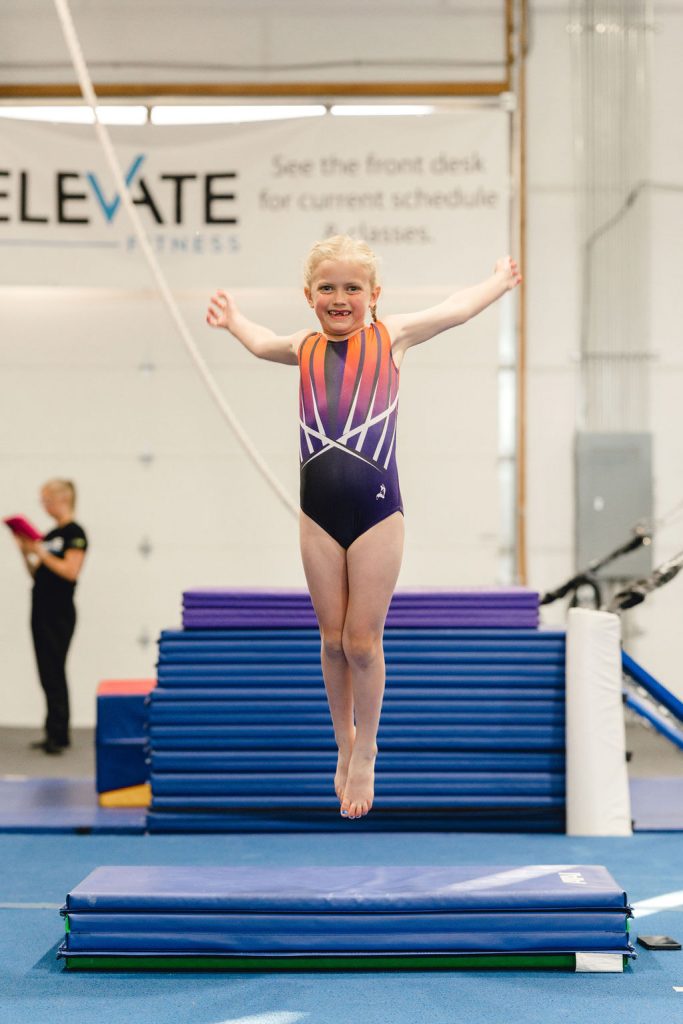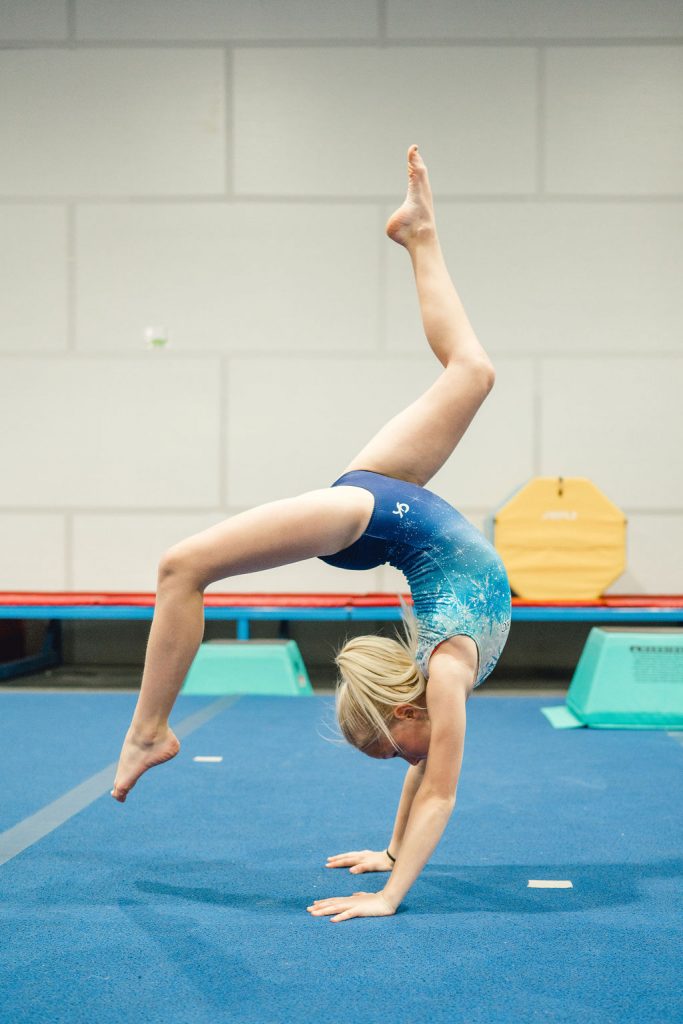Gymnastics is often seen as a physical activity that helps children stay fit, but it also plays a key role in helping them develop confidence and life skills. From learning how to master new movements to building perseverance, gymnastics helps children grow mentally, emotionally, and socially. Gymnastics supports children’s overall development, and has many benefits that go far beyond physical fitness.
The Connection Between Gymnastics and Confidence
Building Self-Confidence Through Skill Mastery
One of the greatest confidence boosters for children in gymnastics is the mastery of new skills. As children participate in gymnastics, they are continuously challenged with new movements, routines, and techniques that require practice and patience. Each time a child successfully performs a new skill—whether it’s a cartwheel, handstand, or more complex routine—they feel a sense of accomplishment. This progressive learning model allows children to see their own growth over time, which naturally boosts their self-confidence.
The small, incremental achievements in gymnastics play a vital role in showing children that hard work and persistence lead to success. As they set out to conquer new skills, the gradual improvement builds their confidence in their own abilities, teaching them that they are capable of achieving difficult goals with consistent effort.
Overcoming Challenges and Fears
Gymnastics often requires children to step outside their comfort zones and try new things. Whether it’s attempting a skill that seems intimidating or performing in front of others during competitions, gymnastics encourages kids to face their fears head-on. As children practice and overcome these challenges, they develop a resilience that carries over into other areas of their life.
Facing these obstacles and conquering them helps children become more confident in their ability to handle difficult situations. The lessons learned in gymnastics about overcoming fear and pushing through discomfort can be applied to real-life situations, helping kids build a mental toughness that will serve them throughout their adult lives.

The Role of Teamwork in Confidence Building
Gymnastics as a Team Sport
Although gymnastics is often viewed as an individual sport, there are many aspects of it that require teamwork. From group conditioning to supporting teammates during practice and competitions, gymnastics encourages children to work together to achieve a common goal. These collaborative experiences help build a child’s confidence by allowing them to contribute to a team’s success, rather than focusing solely on individual achievements.
Through these team dynamics, children learn how to trust and rely on others while also gaining confidence in their own contributions. The sense of belonging and camaraderie that comes with being part of a gymnastics team provides kids with the emotional support they need to thrive.
Supporting and Encouraging Peers
In gymnastics, children not only rely on their teammates but also learn the importance of supporting others. Whether it’s cheering on a fellow gymnast during practice or offering words of encouragement after a fall, being part of a gymnastics team fosters a sense of community. As children encourage their peers, they also begin to feel supported and valued in return, which reinforces their confidence.
Being part of a positive environment where everyone is working toward a common goal helps children realize that they can rely on others for support while also providing it. This give-and-take dynamic builds emotional resilience and contributes to a sense of self-worth.
Setting and Achieving Personal Goals
The Importance of Setting Goals
Gymnastics teaches children the importance of setting realistic, achievable goals. Each new skill or routine represents a goal that can be worked toward, and this process of setting small milestones helps children learn how to focus their efforts and stay committed. By setting and achieving personal goals, kids develop a strong sense of responsibility and ownership over their progress.
This goal-setting process also teaches children how to prioritize their time and energy, an invaluable skill that extends beyond gymnastics. As they grow accustomed to setting and reaching goals in gymnastics, children become more confident in their ability to achieve their objectives in other areas of life.
Celebrating Progress, Not Perfection
One of the key lessons in gymnastics is that progress is more important than perfection. Children are encouraged to focus on improving their skills over time, rather than expecting to perform perfectly from the start. This shift in mindset reduces pressure and boosts self-esteem, as kids learn to celebrate their efforts and progress.
By celebrating small wins and improvements, children begin to understand that growth takes time and effort. This teaches them patience and persistence while reinforcing the idea that they are capable of continuous improvement.

Building Perseverance and Resilience
Learning Through Failure
In gymnastics, children will inevitably experience falls, mistakes, and setbacks. However, these moments are seen as valuable learning opportunities. Gymnastics teaches children that failure is part of the process and that perseverance is the key to success. By repeatedly trying and eventually succeeding, children develop resilience and a strong work ethic.
Learning to fail and get back up again builds emotional strength, teaching children that setbacks are temporary and can be overcome with effort and determination. This lesson is one of the most powerful aspects of gymnastics, as it equips children with the mental tools to tackle challenges in all areas of life.
Developing a Growth Mindset
Gymnastics instills in children a growth mindset—the belief that abilities can be developed through dedication and hard work. Instead of viewing their abilities as fixed, children learn that improvement comes from consistent practice. This mindset helps children approach challenges with curiosity and optimism, knowing that with effort, they can get better over time.
Developing a growth mindset not only boosts confidence but also helps children become more adaptable and open to learning. This flexibility and willingness to grow will serve them well in any future endeavor.
The Mental and Emotional Benefits of Gymnastics
Increased Focus and Discipline
Gymnastics is a highly structured sport that requires focus and discipline. As children follow routines and instructions, they develop the ability to concentrate for extended periods. This increased focus can translate into better performance in school and other extracurricular activities.
Emotional Regulation and Confidence
Through gymnastics, children learn how to manage their emotions, especially in high-pressure situations. They develop coping mechanisms for dealing with stress, frustration, and nerves, all of which help build emotional resilience. This emotional regulation not only boosts confidence but also helps children feel more in control of their experiences.
How Parents Can Support Confidence Building in Gymnastics
Encouraging Without Pressure
Parents play a key role in supporting their child’s confidence in gymnastics. It’s important to encourage participation without putting too much pressure on performance. Letting children explore their abilities in a stress-free environment helps them enjoy the sport and develop confidence naturally.
Celebrating Effort and Growth
Parents can also celebrate their child’s efforts and progress, rather than focusing solely on outcomes or achievements. By praising dedication and improvement, parents reinforce the idea that personal growth is the ultimate goal.
Conclusion
Gymnastics offers children much more than physical fitness. It builds confidence, teamwork, perseverance, and emotional resilience, all of which contribute to their overall growth. Parents who encourage their child’s participation in gymnastics are investing in their mental, emotional, and physical well-being.
Try it FREE!
We offer one free trial class to all students who are interested in our programs. From NinjaZone to Tumbling, give one of our classes are shot. After all…. it’s FREE!


